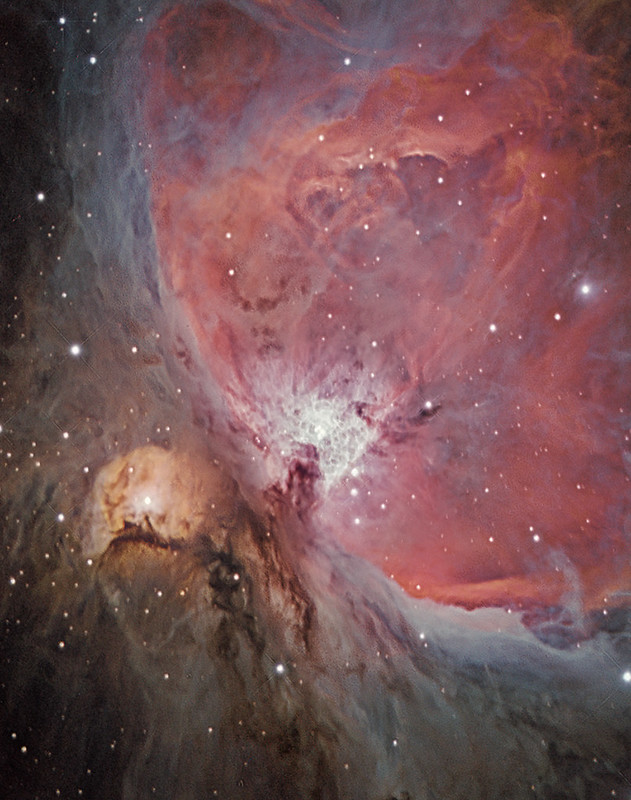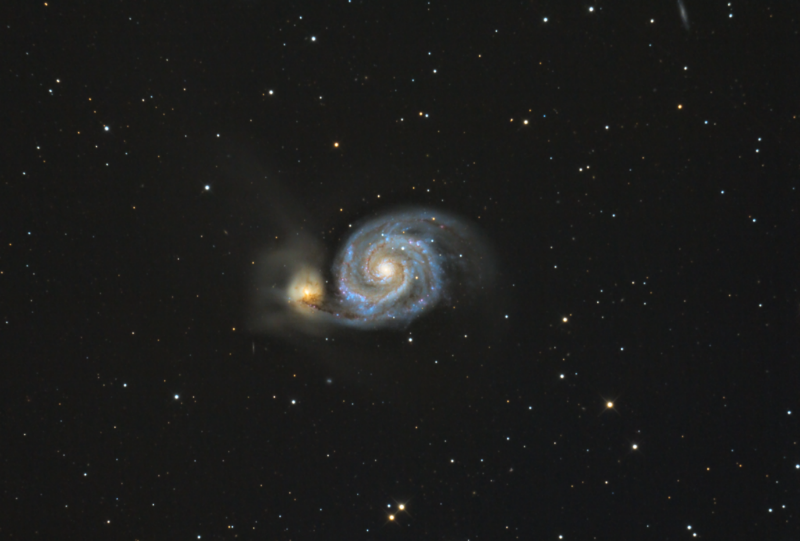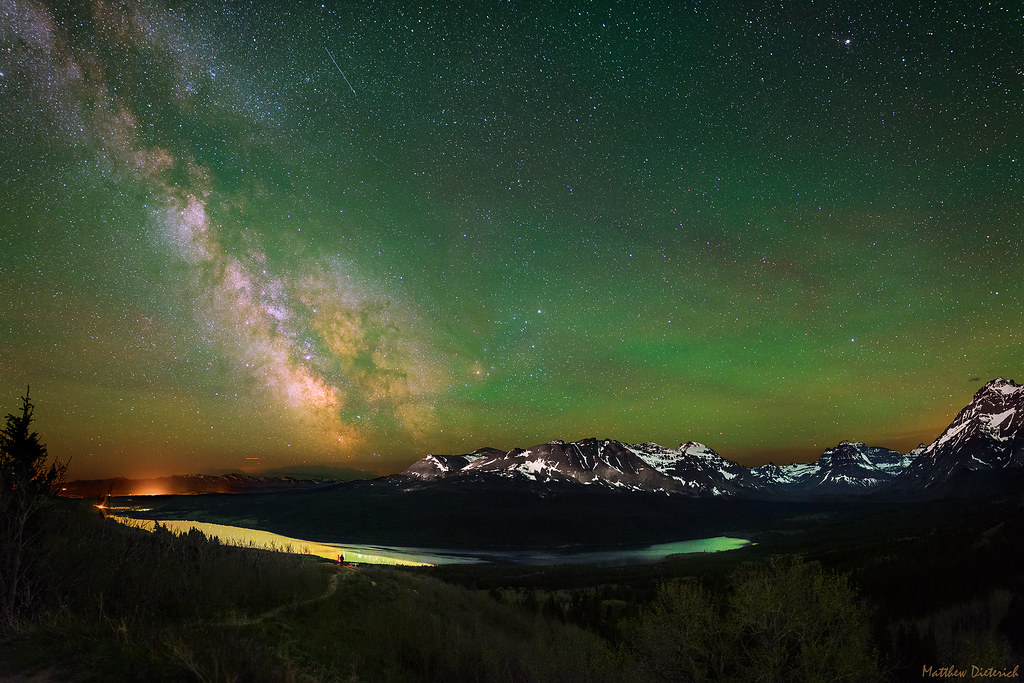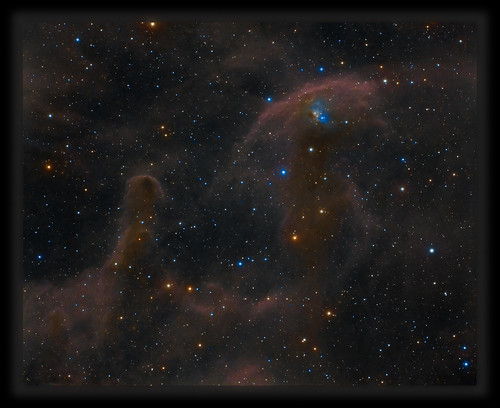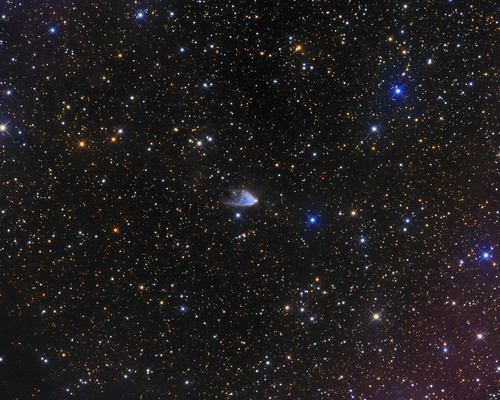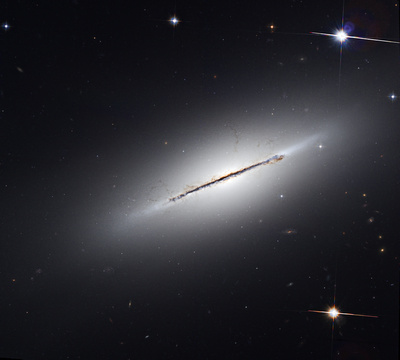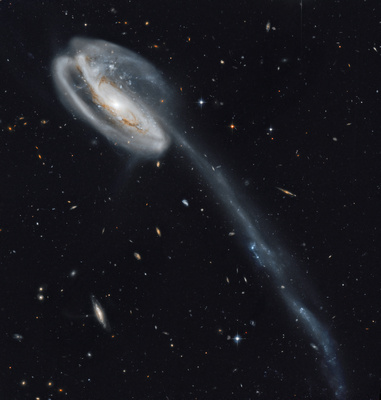Submissions: 2016 February
Re: Submissions: 2016 February
This is a wide field of the region around M81 and M82 showing the IFN in the region.
Telescope: Takahashi FSQ106EDXIII+reducer.
Camera: Hutech Canon 6D
Mount Astro-Physics 900GTOCP3
Integration time: 85 5minute subs.
Telescope: Takahashi FSQ106EDXIII+reducer.
Camera: Hutech Canon 6D
Mount Astro-Physics 900GTOCP3
Integration time: 85 5minute subs.
Re: Submissions: 2016 February
NGC 1316 - lenticular galaxy in Fornax
Copyright: [url=mailto://info@irida-observatory.org]Velimir Popov, Emil Ivanov[/url]
NGC 1316 (also known as Fornax A) is a galaxy about 60 million light-years away in the constellation Fornax. It is the fourth-brightest radio source in the sky. NGC 1316 is located at the edge of the Fornax Cluster of galaxies. NGC 1316 appears to be interacting with NGC 1317, a small spiral galaxy to the north. However, that small spiral galaxy does not appear to be sufficiently large enough to cause the distortions seen in the structure of this galaxy. The galaxy NGC 1316 may be the site of a galaxy-merger in progress. The strange dusty lines could be caused by interactions with another galaxy over the past billion years.(Unusual Giant Galaxy NGC 1316).
Higher resolution: NGC 1316
Some more information: website ...
Thank you for looking ...
http://www.irida-observatory.org
Copyright: [url=mailto://info@irida-observatory.org]Velimir Popov, Emil Ivanov[/url]
NGC 1316 (also known as Fornax A) is a galaxy about 60 million light-years away in the constellation Fornax. It is the fourth-brightest radio source in the sky. NGC 1316 is located at the edge of the Fornax Cluster of galaxies. NGC 1316 appears to be interacting with NGC 1317, a small spiral galaxy to the north. However, that small spiral galaxy does not appear to be sufficiently large enough to cause the distortions seen in the structure of this galaxy. The galaxy NGC 1316 may be the site of a galaxy-merger in progress. The strange dusty lines could be caused by interactions with another galaxy over the past billion years.(Unusual Giant Galaxy NGC 1316).
Higher resolution: NGC 1316
Some more information: website ...
Thank you for looking ...
http://www.irida-observatory.org
- astrochuck
- Ensign
- Posts: 45
- Joined: Thu Jun 28, 2012 8:48 pm
- AKA: Chuck Manges
- Contact:
-
Martin Bernier
- Ensign
- Posts: 13
- Joined: Wed Apr 11, 2012 6:39 am
- Location: St-Liboire, Québec
Re: Submissions: 2016 February
Orion nebula
http://www.astrosurf.com/astrobernier
Copyright: Martin Bernier Full: http://www.astrosurf.com/astrobernier/m42_fev16
Location, St-Liboire, Québec.
AT12IN F4 sur EQ8
QSI 683wsg à –50 degrés.
Autoguidage. ASI120mm sur diviseur optique. Avec PHD2.
filtres Astrodon.
Luminance=2x10 minutes
rouge = 6x5 minutes.
vert = 6x5 minutes.
bleu = 6x5 minutes.
Ha= 4x10 & 4x1 minutes.
O3=4x10 & 4x1 minutes.
S2=4x10 & 4x1 minutes.
En bin 1x1 partout.
Acquisitions et prétraitement CCDSoft.
Traitement final PS CS6.
Thanks for looking
http://www.astrosurf.com/astrobernier
Copyright: Martin Bernier Full: http://www.astrosurf.com/astrobernier/m42_fev16
Location, St-Liboire, Québec.
AT12IN F4 sur EQ8
QSI 683wsg à –50 degrés.
Autoguidage. ASI120mm sur diviseur optique. Avec PHD2.
filtres Astrodon.
Luminance=2x10 minutes
rouge = 6x5 minutes.
vert = 6x5 minutes.
bleu = 6x5 minutes.
Ha= 4x10 & 4x1 minutes.
O3=4x10 & 4x1 minutes.
S2=4x10 & 4x1 minutes.
En bin 1x1 partout.
Acquisitions et prétraitement CCDSoft.
Traitement final PS CS6.
Thanks for looking
Re: Submissions: 2016 February
Original image: http://www.mikeberthonjones.smugmug.com ... II%209.jpg
Part of the Vela supernova remnant near Pismis 4.
Copyright Mike and Trish Berthon-Jones
Red: [SII] 9hrs
Green: H-alpha 5hrs
Blue: [OIII] 10hrs
All 1 hr unbinned subs
Aspen CG16M on 20" PlaneWave
Euchareena, rural NSW, Australia
All scope control, acquisition, and image processing software written by MBJ
Viewers may notice a dragon, bright eye marked by the brightest star in the image, fiery blue tail toward 2 o'clock. The object is quite strong in [SII] as perhaps befits a supernova remnant.
Part of the Vela supernova remnant near Pismis 4.
Copyright Mike and Trish Berthon-Jones
Red: [SII] 9hrs
Green: H-alpha 5hrs
Blue: [OIII] 10hrs
All 1 hr unbinned subs
Aspen CG16M on 20" PlaneWave
Euchareena, rural NSW, Australia
All scope control, acquisition, and image processing software written by MBJ
Viewers may notice a dragon, bright eye marked by the brightest star in the image, fiery blue tail toward 2 o'clock. The object is quite strong in [SII] as perhaps befits a supernova remnant.
Re: Submissions: 2016 February
NGC 6744 - A Sibling of the Milky Way in Pavo
Copyright: [url=mailto://info@irida-observatory.org]Velimir Popov, Emil Ivanov[/url]
NGC 6744 is a spiral galaxy about 30 million light-years away in the constellation Pavo. The NGC 6744 is one of the galaxies most similar to our Milky Way in the local universe. There is even a distorted companion galaxy — NGC 6744A, seen as a smudge to the upper right of NGC 6744, which is reminiscent of one of the Milky Way’s neighboring Magellanic Clouds. One difference between NGC 6744 and the Milky Way is their size. While our galaxy is roughly 100,000 light-years across, NGC 6744 is bigger with a disk stretching 175 000 light-years across.(Spiral Galaxy NGC 6744).
Higher resolution: NGC 6744
Some more information: website ...
Thank you for looking ...
http://www.irida-observatory.org
Copyright: [url=mailto://info@irida-observatory.org]Velimir Popov, Emil Ivanov[/url]
NGC 6744 is a spiral galaxy about 30 million light-years away in the constellation Pavo. The NGC 6744 is one of the galaxies most similar to our Milky Way in the local universe. There is even a distorted companion galaxy — NGC 6744A, seen as a smudge to the upper right of NGC 6744, which is reminiscent of one of the Milky Way’s neighboring Magellanic Clouds. One difference between NGC 6744 and the Milky Way is their size. While our galaxy is roughly 100,000 light-years across, NGC 6744 is bigger with a disk stretching 175 000 light-years across.(Spiral Galaxy NGC 6744).
Higher resolution: NGC 6744
Some more information: website ...
Thank you for looking ...
http://www.irida-observatory.org
Re: Submissions: 2016 February
Orion 8 Panel Mosaic: From the Flame to the Great Orion Nebula
http://www.buckeyestargazer.net
Copyright: Joel Short
http://www.buckeyestargazer.net
Copyright: Joel Short
- moonrocks
- Science Officer
- Posts: 119
- Joined: Tue Jun 30, 2015 6:50 pm
- Location: spain, valencia
- Contact:
Re: Submissions: 2016 February
Orion Revisited 2016
http://moonrocksastro.com/index.php/201 ... ited-2016/
Copyright: Paul C Swift
 The Horsehead Nebula. Orion Revisited 2016 by Paul C. Swift, on Flickr
The Horsehead Nebula. Orion Revisited 2016 by Paul C. Swift, on Flickr
http://moonrocksastro.com/index.php/201 ... ited-2016/
Copyright: Paul C Swift
 The Horsehead Nebula. Orion Revisited 2016 by Paul C. Swift, on Flickr
The Horsehead Nebula. Orion Revisited 2016 by Paul C. Swift, on Flickr-
cosmicwreckingball
- Ensign
- Posts: 31
- Joined: Tue May 26, 2015 2:57 pm
- AKA: Matt Harbison
- Location: Chattanooga, TN
- Contact:
Re: Submissions: 2016 February
Copyright: Matt Harbison
Barnard Astronomical Society of Chattanooga
http://www.barnardstar.org
Original Image: http://www.astrobin.com/239186/0/

Details:
The Orion Molecular Cloud Complex
I've been working on shooting things at a larger scale to capture complete constellations. First with my work on my William Optics Star 71, and now with my Canon 100mm. Completed with a Gerd Neumann Filter Drawer system, I've been able to pair with with my ATIK 383 CCD camera. The scale is impressive. Here, I’ve framed the entire Orion Constellation in 9 panels with over 1280 individual light, dark, flat, and bias frames. This mosaic reveals the majestic Barnard Loop surrounding the belt stars, the Horsehead Nebula, the Witch Head Nebula, The Angelfish Nebula, and the Great Orion Nebula.
Integration:
Ha- 20- 300s x 9- 1x1
L - 10- 60s x 9- 2x2
R - 10- 60s x 9- 2x2
G - 10- 60s x 9- 2x2
B - 10- 60s x 9- 2x2
Matching dark frames
20 Flat Frames
20 Bias Frames
Equipment:
Canon 100mm Macro Lens
Atik 383L + Mono
Astronomic Ha 6nm fitler
Astro-Physics Mach 1
Gerd Neumann Filter system
Software:
Capture in Sequence Generator Pro
Calibration in Pixinsight
Edit levels and export in Photoshop
Captured in Cleveland Tennessee, Chattanooga Tn, and Fall Creek Falls State Park
Barnard Astronomical Society of Chattanooga
http://www.barnardstar.org
Original Image: http://www.astrobin.com/239186/0/

Details:
The Orion Molecular Cloud Complex
I've been working on shooting things at a larger scale to capture complete constellations. First with my work on my William Optics Star 71, and now with my Canon 100mm. Completed with a Gerd Neumann Filter Drawer system, I've been able to pair with with my ATIK 383 CCD camera. The scale is impressive. Here, I’ve framed the entire Orion Constellation in 9 panels with over 1280 individual light, dark, flat, and bias frames. This mosaic reveals the majestic Barnard Loop surrounding the belt stars, the Horsehead Nebula, the Witch Head Nebula, The Angelfish Nebula, and the Great Orion Nebula.
Integration:
Ha- 20- 300s x 9- 1x1
L - 10- 60s x 9- 2x2
R - 10- 60s x 9- 2x2
G - 10- 60s x 9- 2x2
B - 10- 60s x 9- 2x2
Matching dark frames
20 Flat Frames
20 Bias Frames
Equipment:
Canon 100mm Macro Lens
Atik 383L + Mono
Astronomic Ha 6nm fitler
Astro-Physics Mach 1
Gerd Neumann Filter system
Software:
Capture in Sequence Generator Pro
Calibration in Pixinsight
Edit levels and export in Photoshop
Captured in Cleveland Tennessee, Chattanooga Tn, and Fall Creek Falls State Park
-
mdieterich
- Science Officer
- Posts: 100
- Joined: Fri Feb 13, 2015 5:50 pm
Re: Submissions: 2016 February
Universal Nights: Glacier National Park Airglow and Milky Way
http://www.mdieterichphoto.com
Copyright: Matt Dieterich https://c2.staticflickr.com/2/1576/2468 ... 0937_h.jpg
https://www.flickr.com/photos/46847275@N04/24681734119/
This image is a 4 panel mosaic of the Milky Way with green airglow in the night sky over Glacier National Park in Montana on May 22nd, 2015. Green airglow is an atmospheric phenomena that occurs when oxygen emits energy in the form of light after oxygen becomes excited by sunlight. A road overlooking this beautiful snow-capped mountain range and glacial lake made for a memorable scene to capture. My fellow astrophotographer friend David Lane can be seen down the small trail standing as mere tiny dot with his camera gear compared to the wide open landscape. Amazing how the lake water reflected the star light and airglow. For me, this is one of my favorite photos that I captured this past summer. Being out under the stars away from city lights opens up an entirely new world that I hope all humans can experience. If you ever are in Montana during summer, make sure to stop up at Glacier National Park and view the stars on a clear night. I used my Nikon D750 and 24mm lens set to ISO 5000 and F/1.4.
Thanks for looking,
Matt Dieterich
http://www.mdieterichphoto.com
Copyright: Matt Dieterich https://c2.staticflickr.com/2/1576/2468 ... 0937_h.jpg
https://www.flickr.com/photos/46847275@N04/24681734119/
This image is a 4 panel mosaic of the Milky Way with green airglow in the night sky over Glacier National Park in Montana on May 22nd, 2015. Green airglow is an atmospheric phenomena that occurs when oxygen emits energy in the form of light after oxygen becomes excited by sunlight. A road overlooking this beautiful snow-capped mountain range and glacial lake made for a memorable scene to capture. My fellow astrophotographer friend David Lane can be seen down the small trail standing as mere tiny dot with his camera gear compared to the wide open landscape. Amazing how the lake water reflected the star light and airglow. For me, this is one of my favorite photos that I captured this past summer. Being out under the stars away from city lights opens up an entirely new world that I hope all humans can experience. If you ever are in Montana during summer, make sure to stop up at Glacier National Park and view the stars on a clear night. I used my Nikon D750 and 24mm lens set to ISO 5000 and F/1.4.
Thanks for looking,
Matt Dieterich
Last edited by bystander on Mon Feb 15, 2016 9:37 pm, edited 2 times in total.
Reason: Please, no hotlinks to images > 500KB. Substituded smaller image.
Reason: Please, no hotlinks to images > 500KB. Substituded smaller image.
-
sebyta
- Ensign
- Posts: 27
- Joined: Fri Feb 15, 2013 1:11 pm
- AKA: Sebastian Colombo
- Location: Buenos Aires, Argentina
- Contact:
Re: Submissions: 2016 February
Lagoon and Trifid with Bigfoot footprint.
Picture taken from San Antonio de Areco, Buenos Aires, Argentina 24/05/15
They are three hours of exposure in shots of 5 minutes ISO 800.
Astro-Tech Tube Apo astrograph Quad F6/5.
With guided search 162 MM.
NEQ6 Pro mount.
Mono camera QHYII Guide.
Canon 450 xsi Reformed unfiltered IR and refrigerated.
To view the image in a slightly higher resolution please click here
http://1.bp.blogspot.com/-pp5o1lTJMKs/V ... 2BBLOG.jpg
Picture taken from San Antonio de Areco, Buenos Aires, Argentina 24/05/15
They are three hours of exposure in shots of 5 minutes ISO 800.
Astro-Tech Tube Apo astrograph Quad F6/5.
With guided search 162 MM.
NEQ6 Pro mount.
Mono camera QHYII Guide.
Canon 450 xsi Reformed unfiltered IR and refrigerated.
To view the image in a slightly higher resolution please click here
http://1.bp.blogspot.com/-pp5o1lTJMKs/V ... 2BBLOG.jpg
Last edited by sebyta on Tue Feb 16, 2016 12:05 pm, edited 3 times in total.
Re: Submissions: 2016 February
Warm summer night near Magellan telescopes (Las Campanas Observatory, Chile). 28 Jan 2016
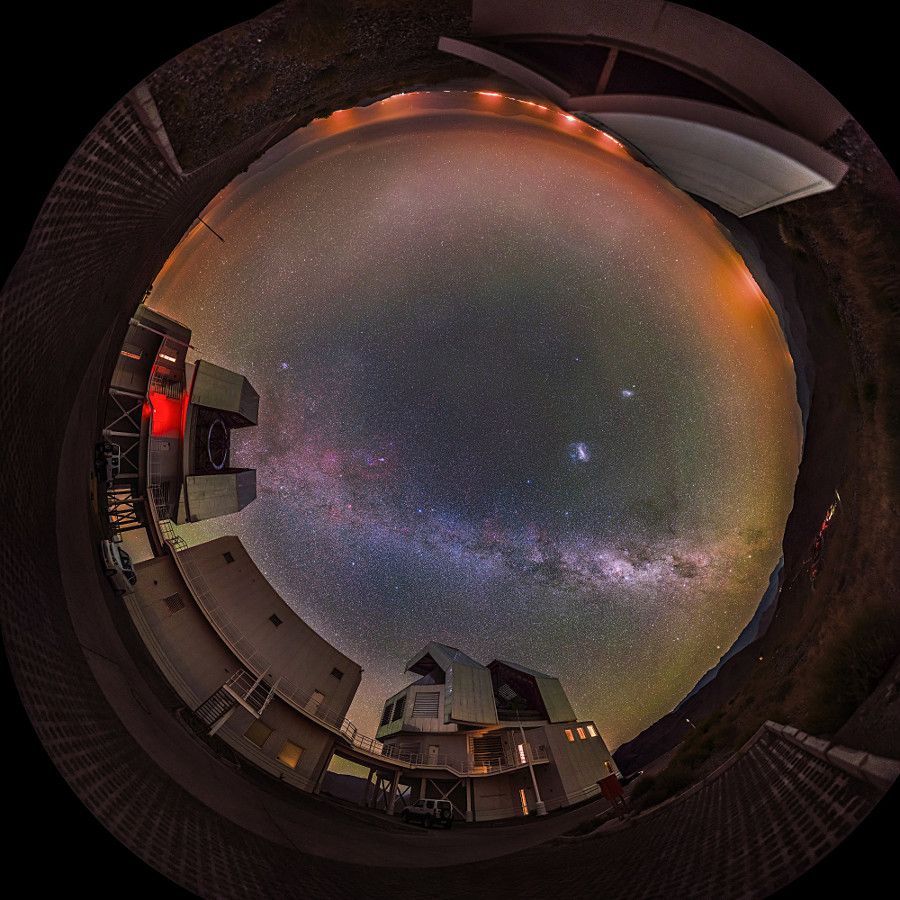
Author: Igor Chilingarian (Smithsonian Astrophysical Observatory)
a 2000x2000 version (0.8Mb)
a 6000x6000 version (12Mb)

Author: Igor Chilingarian (Smithsonian Astrophysical Observatory)
a 2000x2000 version (0.8Mb)
a 6000x6000 version (12Mb)
- moonrocks
- Science Officer
- Posts: 119
- Joined: Tue Jun 30, 2015 6:50 pm
- Location: spain, valencia
- Contact:
Re: Submissions: 2016 February
“The Space walk”
http://moonrocksastro.com/index.php/201 ... ited-2016/
Copyright: Paul C Swift.
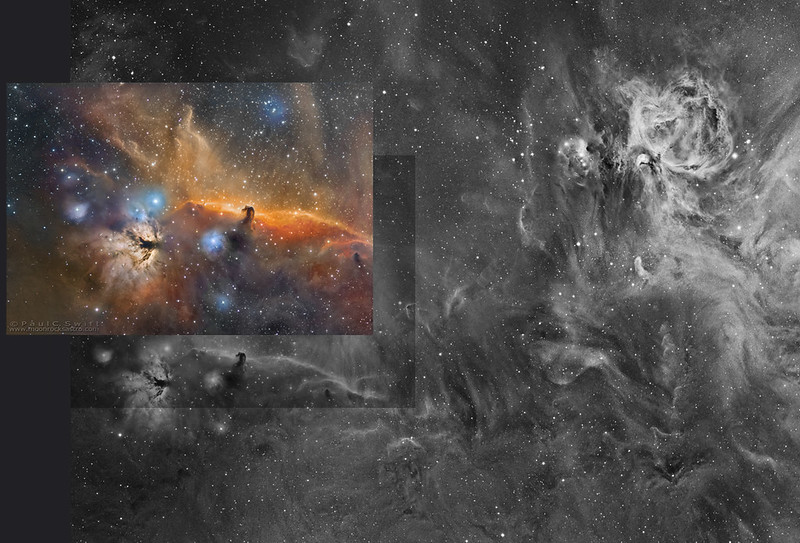 The Orion Nebula skyscape. “The Space walk” by Paul C. Swift, on Flickr
The Orion Nebula skyscape. “The Space walk” by Paul C. Swift, on Flickr
http://moonrocksastro.com/index.php/201 ... ited-2016/
Copyright: Paul C Swift.
 The Orion Nebula skyscape. “The Space walk” by Paul C. Swift, on Flickr
The Orion Nebula skyscape. “The Space walk” by Paul C. Swift, on Flickr-
Efrain Morales
- Commander
- Posts: 508
- Joined: Fri Oct 22, 2010 8:15 pm
- AKA: Jaicoa
- Location: Aguadilla, Puerto Rico
- Contact:
Jupiter Map Animation - Feb.2016
Jupiter Map Animation from sessions on February 6,8,9,11th - 2016. Created usinf WinJUPOS software. Animation At: https://www.flickr.com/photos/54342905@ ... ed-public/
-
Andromeda 2013
- Science Officer
- Posts: 196
- Joined: Tue Jul 09, 2013 2:11 pm
- Contact:
-
Andromeda 2013
- Science Officer
- Posts: 196
- Joined: Tue Jul 09, 2013 2:11 pm
- Contact:
Re: Submissions: 2016 February
Horsehead Nebula
[Ha][OIII] Bi-color with RGB stars
Larger Image available at:
http://www.astrobin.com/239318/0/
Nick Pavelchak
Altamont, NY
[Ha][OIII] Bi-color with RGB stars
Larger Image available at:
http://www.astrobin.com/239318/0/
Nick Pavelchak
Altamont, NY
-
Josh Smith
- Ensign
- Posts: 48
- Joined: Sat Aug 08, 2015 5:01 pm
-
Oleg Bryzgalov
- Ensign
- Posts: 73
- Joined: Tue Apr 26, 2011 8:45 am
- Location: Village Khlepcha near Kiev, Ukraine
- Contact:
Comet C/2013 US10 Catalina and UGC3326
Cassegrain 369 F/6.7 (2463mm)
27x60"
Processed with: Astroart4, StarTools1.4 and Paint Shop Pro X7
Frasso Sabino (Italy)
Roberto Haver and Cristina Cellini
27x60"
Processed with: Astroart4, StarTools1.4 and Paint Shop Pro X7
Frasso Sabino (Italy)
Roberto Haver and Cristina Cellini
-
hewholooks
- Ensign
- Posts: 13
- Joined: Sun Aug 29, 2010 2:47 pm
Re: Submissions: 2016 February
NGC 5866 from Hubble Legacy Data. I post this image because after I processed the data from the Hubble Legacy Archive, I noticed some wispy dust lanes in the upper part of the galaxy that I hadn't noted on other versions of this object. I don't think it's a processing artifact. It's not very evident in the small hot linked image on this post, but here's a link to a larger image where it's pretty obvious. http://hwilson.zenfolio.com/img/s10/v10 ... 7526-6.jpg
Processed by Hunter Wilson 2-17-2016
Processed by Hunter Wilson 2-17-2016
-
hewholooks
- Ensign
- Posts: 13
- Joined: Sun Aug 29, 2010 2:47 pm
Re: Submissions: 2016 February
UC 10214, The Tadpole in Draco assembled from Hubble Legacy Archive data 2-16-2016 by Hunter Wilson. Full size image here: http://hwilson.zenfolio.com/img/s3/v25/p1735685391.jpg
Wow! There's a lot going on in this field!
Thanks - Hunter
Wow! There's a lot going on in this field!
Thanks - Hunter
-
Andromeda 2013
- Science Officer
- Posts: 196
- Joined: Tue Jul 09, 2013 2:11 pm
- Contact:
Re: Submissions: 2016 February
Moon winter halo
A 22° halo is a type of optical phenomenon, forming a circle with a radius of approximately 22° around the Moon, as the moonlight is refracted on millions of randomly oriented hexagonal ice crystals suspended in the atmosphere.
https://www.flickr.com/photos/92681330@ ... otostream/
Copyright: Daniel Pasternak
A 22° halo is a type of optical phenomenon, forming a circle with a radius of approximately 22° around the Moon, as the moonlight is refracted on millions of randomly oriented hexagonal ice crystals suspended in the atmosphere.
https://www.flickr.com/photos/92681330@ ... otostream/
Copyright: Daniel Pasternak
-
IanP
- Science Officer
- Posts: 135
- Joined: Fri Jan 06, 2012 5:21 am
- Location: Perth, Western Australia
- Contact:
M42 + zillions tons of dust
Last edited by IanP on Fri Feb 19, 2016 6:37 am, edited 1 time in total.

